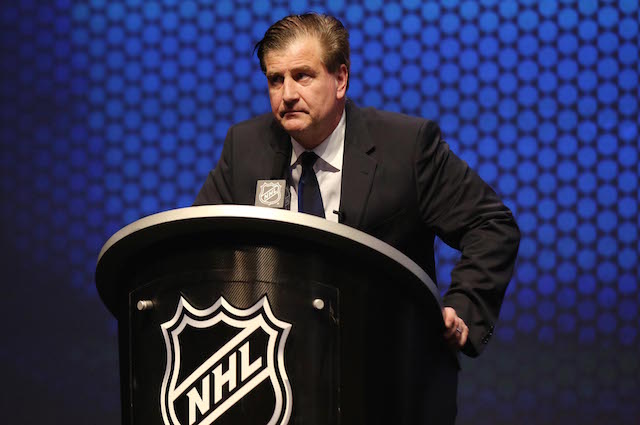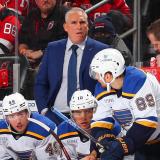
The 2014-15 season was a nice comeback year for the Vancouver Canucks. They rebounded from the very forgettable John Tortorella experience, they finished with more than 100 points in a tough Western Conference and returned to the playoffs. But in the months that have followed their first-round loss to the Calgary Flames general manager Jim Benning has taken the team down a strange and bizarre path that doesn't seem to have any real direction.
Even though they were back in the postseason this past year and still have Henrik and Daniel Sedin, their window as a true Stanley Cup contender has likely closed. But with 11 players on the roster over the age of 29, including eight players that are age 32 or older, they're not really a rebuilding team, either. Like the Boston Bruins, their opponents in the 2011 Stanley Cup Final, they are a team that seems to be stuck in the middle of the two extremes. Instead of picking a direction this summer (all-in to try and capitalize on the remaining years the Sedin's have in the league, or a total tear down to kick off a true rebuilding process) they have simply made a series of head-scratching moves, each more confusing than the last.
Perhaps the best move was their decision to trade the remaining year of Kevin Bieksa's contract to the Anaheim Ducks for a 2016 second-round draft pick. Bieksa's best days are clearly behind him, and the trade not only allowed the Canucks to clear some cap space, it also brought them a future asset back in return. Beyond that move it's hard to see how anything the Canucks have done this summer has made them better now or in the future.
They traded Eddie Lack, statistically the best goalie on the roster in 2014-15, to the Carolina Hurricanes in exchange for two draft picks at this year's draft. Then, shortly after that move Benning stood in front of the team's season ticket holders and told them he could have traded Ryan Miller because teams were calling about the veteran goalie. Considering that Miller is coming off of a down year, isn't likely to get better at this point in his career (he will turn 36 this season, an age that isn't kind to NHL goaltenders), and still has two years and $12 million remaining on his contract it's no surprise that the fans in attendance responded by booing their GM.
They also moved 25-year-old forward Zack Kassian to the Montreal Canadiens in exchange for Brandon Prust, a physical forward that is five-years older than Kassian, more expensive, and is not only not as productive as Kassian, but also has far less upside.
Just look at the comparison of their production both last year and over the past three seasons.
| Zack Kassian vs. Brandon Prust Production Comparison | |||||
| Player | 14-15 Games | 14-15 Goals | 14-15 Points | 14-15 Points/60 | 3 years Points/60 |
| Zack Kassian | 42 | 10 | 16 | 1.84 | 1.67 |
| Brandon Prust | 82 | 4 | 18 | 1.08 | 1.25 |
Kassian is also only eligible for restricted free agency after this season while Prust will become a UFA. Less production. More salary. Fewer years of control. What is the long-term gain here? How does this make Vancouver better in any way?
And then there was Tuesday's trade that saw the team send forward Nick Bonino, defenseman Adam Clendening and a 2016 second-round draft pick (the draft pick they acquired for Bieksa) to the Pittsburgh Penguins in exchange for Brandon Sutter and a third-round draft pick.
This move might be the most confusing of them all.
Even if you look at it as a straight-up swap of Bonino for Sutter it's hard to see where the Canucks are coming out ahead. Bonino has been by far the more productive of the two in recent years and is still signed for two more years at a very reasonable cap hit of $1.9 million per season. Sutter will not only count more against the cap this season ($3.3 million) but will also be an unrestricted free agent next summer. So they will either lose him for nothing, or end up paying him even more money for what will most likely be worse production than they would have received from Bonino.
Again, just look at the production comparison for the two players. This one is even more lopsided than the Kassian for Prust swap as Bonino averages nearly one additional point per 60 minutes of 5-on-5 ice time.
| Nick Bonino vs. Brandon Sutter Production | |||||
| Player | 14-15 Games | 14-15 Goals | 14-15 Points | 14-15 Points/60 | 3 years Points/60 |
| Nick Bonino | 75 | 15 | 39 | 2.04 | 1.93 |
| Brandon Sutter | 80 | 21 | 33 | 1.18 | 1.09 |
After the trade Benning said the Canucks view Sutter as a "foundation player," a strong statement when it involves a player that turns 27 this season and has only once topped 40 points in a single season (and that was six years ago).
The reality, though, is that Sutter can be a very frustrating player because every once in a while he will bust out a great individual move and score a highlight reel goal that grabs your attention. He also has a tremendous wrist shot that is a real weapon off the rush or when he finds himself with some open space in the middle of the ice. But you don't see it consistently enough, and there isn't enough playmaking ability to help make those around him more productive when he isn't the one scoring the goals.
His shot allows him to put 15 or 20 on the board every year, something that always looks good on the final stat line for the season. But when you look back on the year as a whole you have a hard time remembering any of them or any of them making a real impact on the season. He also has a great reputation is as a defensive forward, but there is little objective evidence to back it up.
When you add all of that with the fact that Vancouver added another player (Clendening) to the trade and gave up the better draft pick (sending a second-round pick to Pittsburgh and getting a third-round pick back) it's just a completely bizarre move for the Canucks. Given the difference in production and the difference in contracts it's almost as if Pittsburgh is the team that should have been adding pieces to the trade.
That type of management has been a major problem for the Canucks this summer. With every move the Canucks have made they ended up giving up more production than they received in return, while also taking back the larger salary (minus the Bieksa trade). And that's still true if you add in the decision to deal Lack (again, their best goalie this past season) and keep Miller (by far the more expensive of the two). Obviously there is more to the game than just simple point production (though, that is the object of the game, to outscore your opponents), but do players like Sutter and Prust provide enough in other areas to make up for what should be a drop in production? Not likely.
Basically everything they have done is the exact opposite of what a team in the salary cap era should be trying to do.
None of it makes any sense.





















